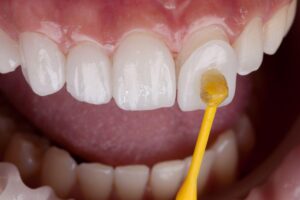Imagine having a brighter, more radiant smile that boosts your confidence and enhances your appearance.
Dental veneers are a popular cosmetic dentistry solution that can help you achieve just that. This blog post will guide you through the veneers cost, the differences between porcelain and composite veneers, insurance coverage, financing options, and more, to help you make an informed decision about your dental care.
Key Takeaways
- Understanding the cost of dental veneers is essential when considering factors such as type, location, expertise of the dentist and desired outcome.
- Porcelain veneers are renowned for their quality and durability with an estimated lifespan up to 15 years while composite veneers provide a more affordable option but shorter life span.
- Investing in dental veneers can result in long lasting results with minimal invasiveness allowing patients to enjoy an aesthetically pleasing smile.
Understanding the Cost of Dental Veneers
Dental veneers are thin, tooth-like coverings that are placed over the visible surfaces of teeth to enhance their aesthetic appearance, especially for stained teeth. The cost range for dental veneers can vary, considering factors such as the type of veneer chosen, geographical location, and the expertise of the dentist. Generally, dental veneers are composed of thin sheets of porcelain or resin composite, designed to mimic the natural tooth structure.
Porcelain veneers are known for their quality and durability, while composite veneers offer affordability and convenience. The type of veneer you choose will ultimately depend on your budget and desired outcome. No matter the veneer type you opt for, considering the cost of associated dental care is important in verifying it’s a suitable investment for your smile.
We will explore the two primary types of dental veneers: porcelain and composite veneers. By examining their cost, appearance, and durability differences, we aim to assist you in making an informed decision about the best option for you.
Porcelain Veneers: Quality and Durability
Porcelain veneers are:
- Thin custom-fitted layers of porcelain that are molded to the teeth
- An ideal solution for crooked teeth or misshapen teeth
- Composed of a high-quality composite material
- Their cost usually ranges between $1,000 and $2,500 per tooth, depending on the quality of composite materials used.
One of the many advantages of porcelain veneers is their durability. They typically have an estimated lifespan of 10 to 15 years before requiring replacement, providing a brighter smile for a longer period. Furthermore, porcelain veneers provide both aesthetic and functional benefits, enhancing the look of the teeth while also protecting them from harm, discoloration, and gum disease.
However, it’s important to be aware of the drawbacks associated with porcelain veneers. In order to ensure the veneers fit correctly, some of the enamel must be removed from the teeth, making it a dental procedure that requires precision. Especially for misshapen teeth, preparing the underlying tooth structure is a vital step to make room for the veneers, ensuring they fit properly and look natural.
Composite Veneers: Affordability and Convenience
Composite veneers, on the other hand, are generally more affordable than other options, ranging from $250 to $1,000 per tooth. They are a popular choice for those looking for veneers near their location and are constructed from dental composite resin, which helps in achieving a radiant smile. Composite veneers are more utilitarian than aesthetic treatments and are a distinct dental care procedure from dental crowns, bridges, or fillings.
One of the benefits of composite veneers is their cost-effectiveness, straightforward application, minimal invasiveness, and ability to provide teeth with a natural-looking shine, thanks to the composite material used. The placement of composite veneers involves selecting and sculpting a shade to best fit the smile, hardening the composite with a high-intensity light, and finally polishing the composite resin until it blends with the natural appearance of the brighter smile.
No-prep composite veneers are another option to consider. These veneers are composed of thin layers of composite resin that are adhered to the surface of teeth without any prior preparation or drilling. This can be an attractive option for those concerned about the cost of porcelain veneers and the invasiveness of the procedure.
Comparing Costs: Porcelain vs. Composite Veneers
Porcelain veneers typically cost more than composite veneers, making the porcelain veneers cost a significant factor in the decision-making process. The average cost of porcelain veneers ranges between $1000 to $2,500 per tooth, influenced by factors such as location and dentist expertise.
On the other hand, composite veneers are more economical and can be finished in fewer appointments, but they are not as sturdy and may not appear as authentic. When drawing a cost comparison between porcelain and composite veneers, evaluating the pros and cons of each option is key. Porcelain veneers are more resilient and have a more authentic aesthetic than composite veneers, but they are more costly. Composite veneers, made from a different composite material, are more economical but may not be as durable or appear as natural.
Your budget, desired outcome, and personal preferences will dictate the decision between porcelain and composite veneers. A discussion with a qualified dentist who can navigate you through the decision-making process and help identify the optimal solution for your unique dental care needs is of paramount importance.
Insurance Coverage and Financing Options for Veneers
With limited insurance coverage for veneers, factoring in the total dental care costs when planning for veneers becomes significant. Since many insurance providers view dental veneers as a cosmetic procedure, they may not cover the cost.
However, don’t let this discourage you from pursuing a radiant smile. Financing options such as CareCredit, Proceed Financing and LendingClub may be able to provide assistance in making the dental procedure more cost-effective. These options can help you manage the cost of your dental veneers, ensuring that you can achieve the smile you’ve always wanted without breaking the bank.
Factors Affecting the Lifespan of Dental Veneers
The lifespan of dental veneers depends on factors like veneer type, proper dental hygiene and routine dentist appointments. Porcelain veneers typically last up to 10-15 years, thanks to the high-quality composite materials used in their construction. Composite veneers generally have a duration of 4-8 years, with the lifespan being influenced by the composite material used.
To maximize the longevity of your veneers, it is advisable to maintain good dental care, abstain from biting hard objects, and attend regular dental check-ups. Proper care and maintenance will not only prolong the life of your veneers but also ensure the health of your natural teeth and gums.
In choosing between porcelain and composite veneers, considering each option’s lifespan and the care level needed for their upkeep is crucial. Both types of veneers can provide a significant improvement in the appearance and function of your teeth, but their longevity and care requirements will ultimately impact your decision.
Choosing the Right Dentist for Your Veneer Procedure
Choosing an apt dentist for a veneer procedure plays a key role in achieving the most satisfying result and ensuring a smooth experience, particularly when you’re seeking veneers in your vicinity. A skilled and experienced dentist, or prosthodontist, can help guide you through the process, ensuring that you receive the best possible care and results.
When selecting a dentist for dental veneers, it is recommended to take the following steps:
- Seek out an expert in the field of porcelain veneers.
- Request referrals from individuals who have had cosmetic dentistry.
- Examine the dentist’s qualifications and experience in veneers.
- Read reviews and testimonials from past patients.
- Schedule a consultation with the dentist to discuss your individual requirements and objectives, as well as your dental care needs.
Taking the time to find the right dentist for your veneer procedure will not only ensure a successful outcome but also contribute to a more comfortable and enjoyable experience.
Caring for Your Dental Veneers
While caring for dental veneers, treating them akin to natural teeth is essential. This includes:
- Brushing twice a day with a soft toothbrush and nonabrasive toothpaste
- Flossing daily
- Avoiding teeth-staining foods and beverages
- Abstaining from dark liquids and hard objects, which can damage your veneers
Routine dental check-ups also play a crucial role in maintaining your dental veneers’ health and longevity. Your dentist can:
- Monitor the condition of your veneers
- Address any issues that may arise
- Ensure that your investment in dental care continues to provide a radiant smile for years to come.
Treating your dental veneers with the same care and attention as your natural teeth allows you to extend their lifespan and relish the perks of a beautiful, confident smile.
The Value of Investing in Dental Veneers
Investing in dental veneers can provide a notable enhancement to the aesthetics and functionality of your teeth, making it a valuable investment for numerous patients seeking a brighter smile. Dental veneers present numerous advantages, such as:
- Enhanced aesthetics
- Lifelike outcomes
- Resistance to staining
- Longevity
- Minimally invasive procedure
- Enduring results
Comprehending the costs, benefits, and aspects involved in opting for dental veneers enables you to make an informed decision on whether this investment suits you. With the proper care and maintenance, dental veneers can transform your smile and boost your confidence for years to come.
Summary
In conclusion, dental veneers are a popular cosmetic dentistry solution that can significantly improve the appearance and function of your teeth. By understanding the costs, benefits, and considerations involved in choosing between porcelain and composite veneers, as well as exploring financing options and proper care, you can make an informed decision about whether veneers are the right investment for you.
The journey to a brighter, more radiant smile starts with the right information and the right dentist in Rockville md. Take the first step towards transforming your smile and boosting your confidence by exploring the world of dental veneers today.
Frequently Asked Questions
How much does a full set of veneers cost in the US?
In the US, veneers typically range from $250 to $2,500 per tooth, so a full set of veneers can cost between $7,200 and $20,000.
How long do veneers last?
Porcelain veneers can last up to 15 years with proper care, while composite veneers last 4-8 years. With reasonable precautions and regular maintenance, veneers can last anywhere from 10-30 years.
How much do veneers cost in Maryland?
In Maryland, the cost for veneers ranges from $200 to $2500 per tooth, with porcelain veneers costing more at an average of $950 to $2500 and composite veneers being cheaper at an average of $200 to $1000.
What factors affect the cost of dental veneers?
Costs of dental veneers vary by geographical location, dentist expertise and level of care provided.
What is the difference in cost between porcelain and composite veneers?
Porcelain veneers tend to cost more than composite veneers as they are made of high-quality material and have a natural appearance.









